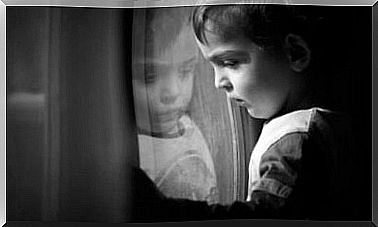The Absence Of Problems Does Not Guarantee Happiness

The absence of problems does not automatically lead to happiness. Even more important is the willingness to change and to tolerate the uncertainty that fear can generate. However, practicing this can be difficult.
As Albert Camus once said: people are obsessed with finding happiness, as if it were the Holy Grail. But well-being is not a goal, but a daily exercise that requires adaptive strategies and new perspectives.
Much time has passed since Martin Seligman – a psychologist at the University of Pennsylvania – stressed the need to look at more than just pathologies.
He said that it is also important to think about improving our mood and well-being.
Positive psychology entered the scene in the 90’s, and since then we have witnessed an explosion of theories and well-meaning advice.
Thousands of books on happiness are published every year. Universities offer hundreds of courses in the subject, and today people like Tal Ben-Shahar consider themselves regular gurus in the subject.
Neuroscience also contributes to the field, with experts discovering what happens in the brain when you are happy and what you can do to increase joy.
All of these trends, approaches and perspectives are interesting and inspiring. But some point out that there is a problematic aspect to all of this: we’ve turned the concept of happiness into a marketing gimmick.
Increasingly, we “educate” the population in what it takes to be happy, but also make people intolerant of sadness, anxiety, uncertainty and discomfort.
The reality of life is not always easy. No matter how much you try to be happy, the situation will sometimes get in the way. That’s why it’s important to think about happiness.
Let’s explore how.

Happiness is not just the absence of problems
It’s easy to believe that you would be happy if you managed to solve all your problems. If that were the case, however, happiness would be extremely rare.
The world we live in is unpredictable. You interact with many people every day, so conflicts and misunderstandings will arise.
It does not matter who you are or where you live. Problems arise and no one is immune to what is happening in the environment or within one.
In recent years, nay voices have emerged in academia to offer different perspectives on happiness.
Psychologists such as Jermone Wakefield (from New York University) and Allan Howitz (from Rutgers University) have written books such as The Loss of Sadness: How Psychiatry Transformed Normal Sorrow Into Depressive Disorder.
This book is about how we try to banish emotions such as sadness and frustration, but if you do not acknowledge them and focus only on positive emotions, you will become emotionally illiterate.
Today, there are so many people who do not know how to deal with stress and anxiety. They do not know why they have a lump in their stomach or why their fears seem paralyzing.
Dealing with adversity and these complex emotional states also has a lot to do with your chances of being happy.
Happiness is daring to act in spite of fear and uncertainty, not the absence of problems
I want to save a definition of happiness that is both inspiring and appropriate, approved by neuroscientists, psychologists, psychiatrists, economists and even Buddhist monks.
It’s all about giving life meaning, having a purpose and being proactive. It is about being willing to grow and accepting adversity as well as challenges in daily life.
According to this alternative perspective, these are the true keys to happiness.
Eduard Punset once said that happiness is about the absence of fear. When this is misinterpreted, this seems a bit perverse because people can not stop feeling fear. This feeling is inherent in who we are and serve a purpose.
This is a good example: “I’m afraid of moving to a new city and starting a new life, but I know I should. Taking this step will help me grow. That’s why I have to be brave and do it despite my fears. ”
I’m aware that problems can arise, but I feel capable of dealing with them
Again, we want to point out that happiness is not the absence of problems. The truth is that happiness begins to make itself at home when we can overcome our challenges.
Sonja Lyubomirsky – a professor of psychology at the University of California – is one of the experts who dispels myths about positive psychology and happiness.
Something she often talks about is that well-being is not defined by achieving goals or having material assets.
People achieve a sense of balance and self-awareness when they feel satisfied with themselves.
When you feel capable of dealing with what may come next, when your self-esteem is strong and when you can deal with fears, stress and anxiety.
When you feel this type of strength, everything flows much better.
Remember that life is not easy. You will encounter potholes in the road and get some bruises; it’s a reality you can not escape from, so accept it.

No one is immune to problems and that things are turned upside down when you least expect it. Instead of trying to fight them, work on your personal growth and psychological strengths that allow you to invest in your well-being.









